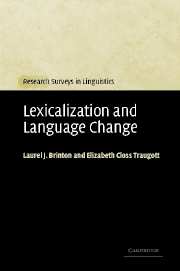Book contents
- Frontmatter
- Contents
- List of figures
- List of tables
- Preface
- List of abbreviations
- 1 Theoretical contexts for the study of lexicalization and grammaticalization
- 2 Lexicalization: definitions and viewpoints
- 3 Views on the relation of lexicalization to grammaticalization
- 4 Toward an integrated approach to lexicalization and grammaticalization
- 5 Case studies
- 6 Conclusion and research questions
- References
- Index of names
- Index of subjects
- Index of words and forms
1 - Theoretical contexts for the study of lexicalization and grammaticalization
Published online by Cambridge University Press: 03 February 2010
- Frontmatter
- Contents
- List of figures
- List of tables
- Preface
- List of abbreviations
- 1 Theoretical contexts for the study of lexicalization and grammaticalization
- 2 Lexicalization: definitions and viewpoints
- 3 Views on the relation of lexicalization to grammaticalization
- 4 Toward an integrated approach to lexicalization and grammaticalization
- 5 Case studies
- 6 Conclusion and research questions
- References
- Index of names
- Index of subjects
- Index of words and forms
Summary
Purpose of the present study
(1) We are celebrating a fascinating holiday today.
is something we might well say to a visitor from abroad, and not think twice about whether holiday and today or the -ing of celebrating and of fascinating function differently from the point of view of our knowledge of language. However, linguists, grammarians, and others who study and think about language, how it is structured, how we come to know it, and how it changes concern themselves with just such questions. In the introduction to the Concise Oxford Dictionary of Linguistics, Matthews says: “Everyone will agree that linguistics is concerned with the lexical and grammatical categories of individual languages” (1997:vi), and this is what our example in (1) is about: holiday, celebrate, and fascinating are usually regarded as “lexical,” members of large, “open” classes of forms that are relatively infrequently used and express relatively concrete meaning, while we, are, and a are regarded as “grammatical,” members of smaller, relatively “closed” classes of forms that are very frequently used and express relatively abstract meaning. Moreover, today is not clearly a lexical or a grammatical form, having partially concrete and partially abstract meaning, and belonging to a rather large set of adverbs. Finally, the -ing of celebrating and the -ing of fascinating, although seen as originating in the same grammatical form, are generally understood as having developed differently over time, the former remaining grammatical and the latter becoming lexical.
- Type
- Chapter
- Information
- Lexicalization and Language Change , pp. 1 - 31Publisher: Cambridge University PressPrint publication year: 2005

